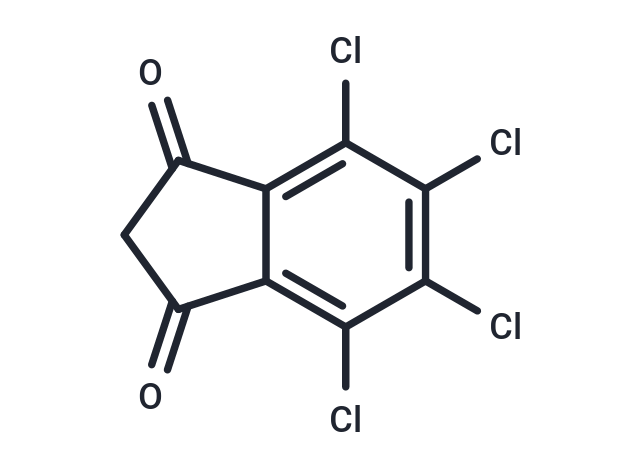Shopping Cart
- Remove All
 Your shopping cart is currently empty
Your shopping cart is currently empty

TCID (UCH-L3 Inhibitor)(IC50=0.6 μM) is a DUB inhibitor of ubiquitin C-terminal hydrolase L3. It has the 125-fold selectivity to L1.

| Pack Size | Price | Availability | Quantity |
|---|---|---|---|
| 2 mg | 31 € | In Stock | |
| 5 mg | 49 € | In Stock | |
| 10 mg | 76 € | In Stock | |
| 25 mg | 169 € | In Stock | |
| 50 mg | 219 € | In Stock | |
| 100 mg | 285 € | In Stock | |
| 1 mL x 10 mM (in DMSO) | 53 € | In Stock |
| Description | TCID (UCH-L3 Inhibitor)(IC50=0.6 μM) is a DUB inhibitor of ubiquitin C-terminal hydrolase L3. It has the 125-fold selectivity to L1. |
| Targets&IC50 | UCHL3:0.6 μM |
| In vitro | TCID is selective for UCH-L3 over UCH-L1 by over 100-fold. [1] NU6027 (10 μM) does not promote YFP-GLT-1 accumulation in intracellular vesicles in transfected MDCK cells, while LDN-57444 (10 μM) promotes YFP-GLT-1 accumulation. NU6027 (10 μM) does not produce long-term lysosomal degradation of GLT-1, while LDN-57444 (10 μM) has such effect. [2] TCID (10 μM) diminishes GlyT2 ubiquitination in brainstem and spinal cord primary neurons, which is more pronounced when UCHL1 is inhibited and when cells are exposed to these inhibitors for longer periods. [3] |
| Alias | UCH-L3 Inhibitor |
| Molecular Weight | 283.92 |
| Formula | C9H2Cl4O2 |
| Cas No. | 30675-13-9 |
| Smiles | Clc1c2C(=O)CC(=O)c2c(Cl)c(Cl)c1Cl |
| Relative Density. | 1.782g/cm3 |
| Storage | Powder: -20°C for 3 years | In solvent: -80°C for 1 year | Shipping with blue ice. | ||||||||||||||||||||||||||||||
| Solubility Information | DMSO: 14.2 mg/mL (50 mM) | ||||||||||||||||||||||||||||||
Solution Preparation Table | |||||||||||||||||||||||||||||||
DMSO
| |||||||||||||||||||||||||||||||

Copyright © 2015-2024 TargetMol Chemicals Inc. All Rights Reserved.